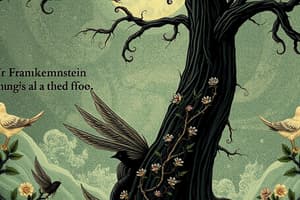Podcast
Questions and Answers
What does Victor's ambition reveal about his character?
What does Victor's ambition reveal about his character?
- He desires companionship.
- He seeks knowledge at any cost. (correct)
- He avoids risk and danger.
- He is content with the status quo.
What does Walton's statement about 'one man's life or death' reveal?
What does Walton's statement about 'one man's life or death' reveal?
His desperate need to be the first to discover new lands.
What is the metaphor of the 'serpent' used to convey in Victor's statement about ambition?
What is the metaphor of the 'serpent' used to convey in Victor's statement about ambition?
- Ambition brings companionship.
- Ambition leads to destruction. (correct)
- Ambition is a reward.
- Ambition is easily achieved.
What does Victor desire to learn about?
What does Victor desire to learn about?
How does Victor interpret the monster's actions?
How does Victor interpret the monster's actions?
What do Victor's and the monster's desires for revenge signify?
What do Victor's and the monster's desires for revenge signify?
How does the monster view himself in relation to Adam?
How does the monster view himself in relation to Adam?
What does the imagery of 'licked' and 'forked tongues' suggest?
What does the imagery of 'licked' and 'forked tongues' suggest?
What realization does the monster have upon viewing himself?
What realization does the monster have upon viewing himself?
What does Victor's declaration of holding his dead mother signify?
What does Victor's declaration of holding his dead mother signify?
Flashcards are hidden until you start studying
Study Notes
Ambition and Exploration
- Victor Frankenstein and Walton share dangerous ambition, evident in the phrase 'I shall satiate my ardent curiosity.'
- Their relentless pursuit of knowledge reflects a desire to challenge the boundaries of science and exploration.
Ambition and Desire for Discovery
- Walton’s statement, 'One man's life or death were but a small price to pay,' emphasizes his desperate quest for discovery.
- This mirrors Victor’s willingness to sacrifice relationships and morality for the sake of scientific achievements.
The Temptation of Ambition
- The metaphor of 'the serpent' implies that ambition can lead to downfall, linking Biblical punishment and Victor's rebellion against divine order.
- Victor's comparison to Prometheus suggests a critique of overreaching ambition and the inevitable consequences of defying nature.
Secrets of Creation
- Victor's desire for 'the secrets of heaven and earth' indicates his ambition to transcend ordinary limits through knowledge.
- The reference to heavenly secrets highlights an urge to challenge divine authority, provoking a moral conflict with contemporary religious beliefs.
Acceptance and Perception of the Monster
- The description of the monster's gesture signifies a misinterpretation of intentions; Victor views it as a threat rather than a plea for companionship.
- The verb 'rushed' reflects urgency and foreshadows ongoing isolation, paralleling Shelley’s personal experiences with loss.
Identity of the True Monster
- Victor perceives humans as monstrous in behavior, suggesting moral corruption inherent within mankind.
- The violent imagery linking blood and thirst frames revenge as a transformative force blurring the lines between creator and creation.
Revenge and Isolation
- The quote 'I will glut the maw of death' demonstrates the mutual desire for vengeance that unites Victor and the monster.
- Both characters' actions stem from their profound feelings of isolation and sorrow, leading to a cycle of revenge.
Creation and Rejection
- The monster's claim, 'I ought to be thy Adam, but I am rather the fallen angel,' highlights his longing for acceptance and guidance.
- The contrast with Paradise Lost underscores themes of creation and rejection, portraying the monster as a victim of his own creator's neglect.
Animal Imagery and Revenge
- The phrase 'licked it with their forked and destroying tongues' employs serpent imagery, linking the monster to themes of deceit and malice.
- This animalistic portrayal suggests the monster's calculated revenge is derived from deep-seated feelings of pain and betrayal.
Isolation and Self-Perception
- The monster's realization of his horrific appearance leads to a profound sense of alienation, reflecting on societal rejection.
- The desperation in the exclamation mark illustrates his yearning for acceptance, contrasting with others (like Safie and Elizabeth) who are welcomed despite flaws.
Hatred and Creation
- The image of the monster pointing at Victor's wife's corpse symbolizes a twisted connection between creator and creation, marked by tragedy.
- Alliteration in 'fiendish finger' signifies Victor's deep resentment, hinting at the dark consequences of his scientific pursuits.
Gothic Elements of Death and Creation
- Holding 'the corpse of my dead mother' symbolizes the death of nurturing roles in Victor’s obsession with creation.
- This foreshadowing of Elizabeth's fate connects to themes of fatalism and the destructive impact of Victor's scientific endeavors.
Studying That Suits You
Use AI to generate personalized quizzes and flashcards to suit your learning preferences.




